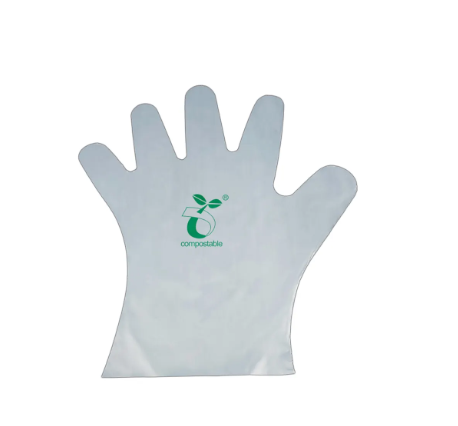Revolutionizing Sustainable Protection with Earth-Friendly Alternatives
The global movement toward environmental sustainability has sparked a transformative shift in personal protective equipment (PPE), with compostable gloves emerging as a groundbreaking solution to combat plastic pollution. These innovative gloves represent a crucial step forward in addressing the overwhelming volume of plastic waste generated by traditional disposable gloves, particularly in industries like healthcare, food service, and personal care.
As environmental consciousness grows, businesses and consumers alike are seeking alternatives that maintain the same level of protection while minimizing their ecological footprint. Compostable gloves offer this perfect balance, providing reliable hand protection while naturally breaking down into organic matter that enriches soil rather than contributing to landfill waste.
Understanding Compostable Glove Technology
Revolutionary Materials and Manufacturing Process
Compostable gloves are engineered using innovative plant-based materials, primarily derived from renewable resources such as cornstarch, potato starch, or other biological polymers. These materials undergo a specialized manufacturing process that ensures they maintain the necessary durability and barrier protection while remaining completely biodegradable under proper composting conditions.
The technology behind these eco-friendly alternatives has evolved significantly, incorporating advanced biopolymer blends that provide flexibility, strength, and comfort comparable to traditional synthetic gloves. Manufacturers have refined their processes to create products that meet stringent industry standards while maintaining their environmental benefits.
Certification and Standards
Quality compostable gloves undergo rigorous testing to meet international composting standards, including certification from recognized organizations. These certifications ensure that the gloves will break down completely within specified timeframes under industrial composting conditions, typically within 180 days, leaving no toxic residues or microplastics behind.
The certification process examines multiple factors, including biodegradation rate, ecotoxicity, and the final composition of the decomposed material. This thorough validation provides users with confidence in both the product's performance and its environmental claims.
Environmental Impact and Advantages
Waste Reduction Benefits
The adoption of compostable gloves presents a significant opportunity to reduce plastic waste in various sectors. Traditional disposable gloves contribute millions of tons of non-biodegradable waste to landfills annually, with a decomposition timeline spanning hundreds of years. In contrast, compostable gloves break down into natural compounds that can actually benefit soil health.
When properly disposed of in commercial composting facilities, these gloves transform into nutrient-rich compost that can be used to enhance soil fertility. This circular approach to waste management represents a fundamental shift from the linear 'take-make-dispose' model to a more sustainable system.
Carbon Footprint Reduction
The manufacturing process of compostable gloves typically requires less energy and produces fewer greenhouse gas emissions compared to traditional petroleum-based alternatives. The use of renewable, plant-based materials helps reduce dependency on fossil fuels and supports a more sustainable supply chain.
Additionally, the biodegradation process of compostable gloves releases significantly less carbon dioxide compared to the decomposition or incineration of conventional plastic gloves, contributing to overall carbon footprint reduction efforts.
Industry Applications and Implementation
Healthcare Sector Integration
The healthcare industry has begun embracing compostable gloves as part of its sustainability initiatives. Medical facilities are finding that these alternatives meet their stringent hygiene requirements while aligning with environmental responsibility goals. The transition requires careful consideration of factors such as storage conditions, shelf life, and disposal protocols.
Healthcare providers are developing new waste management systems to properly separate and process compostable gloves, ensuring they reach appropriate composting facilities rather than traditional waste streams. This systematic approach is essential for maximizing the environmental benefits of switching to compostable alternatives.
Food Service and Hospitality Implementation
Restaurants, hotels, and food processing facilities are increasingly adopting compostable gloves to enhance their sustainability credentials while maintaining food safety standards. These businesses find that compostable gloves integrate seamlessly into existing operations while supporting their green initiatives and appealing to environmentally conscious consumers.
The food service industry's adoption of compostable gloves often accompanies broader sustainability programs, including composting of food waste and other biodegradable materials, creating more efficient waste management systems.
Best Practices for Implementation
Storage and Handling Guidelines
Proper storage and handling of compostable gloves are crucial for maintaining their integrity and effectiveness. These products should be stored in cool, dry conditions away from direct sunlight and extreme temperatures. Understanding the specific storage requirements helps ensure the gloves maintain their protective properties while preserving their compostability.
Staff training on proper handling and disposal procedures is essential for successful implementation. This includes education about the importance of separating compostable gloves from regular waste streams and ensuring they reach appropriate composting facilities.
Disposal and Composting Protocols
Establishing clear disposal protocols is vital for maximizing the environmental benefits of compostable gloves. Organizations should partner with commercial composting facilities capable of processing these materials and develop collection systems that prevent contamination with non-compostable waste.
Regular monitoring and assessment of disposal practices help ensure compliance and identify areas for improvement in the waste management process. This systematic approach supports the successful integration of compostable gloves into organizational sustainability initiatives.
Frequently Asked Questions
How long do compostable gloves take to decompose?
Under proper industrial composting conditions, compostable gloves typically break down within 180 days. However, the exact decomposition time can vary depending on specific composting conditions, including temperature, moisture, and microbial activity.
Are compostable gloves as effective as traditional plastic gloves?
Yes, certified compostable gloves meet the same safety and performance standards as traditional gloves. They undergo rigorous testing to ensure they provide adequate protection and durability for their intended use while maintaining their biodegradable properties.
Can compostable gloves be disposed of in home composting systems?
Most compostable gloves are designed for industrial composting facilities where conditions can be carefully controlled. Home composting systems may not reach the necessary temperatures and conditions for proper decomposition. It's important to follow manufacturer guidelines for disposal.



